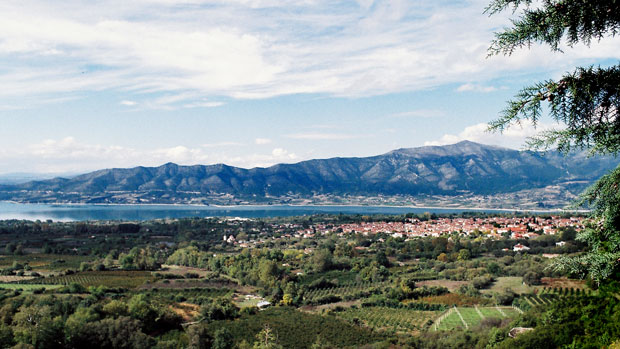The renowned Greek writer Nikos Kazantzakis strongly urged his compatriots in Greece to reconcile their traditional culture with the realities of “modernity”. To that end, Velvento — the birthplace of George Zorbas and the basis of Kazantzakis’ Zorba the Greek — is a model of sustainability that is worthy of emulation.
The former municipality of Velvento is located on the slopes of the Pieria Mountains in northern Greece, facing the picturesque Lake Polyfytos. With an agriculture-based economy and the opportunity to engage in many nature-related activities, it is not difficult to see why the 3,754 residents of this historic town are major stakeholders in the area’s ecological system: it is the main source of their livelihood and central to their daily enjoyment.
Under the leadership of former mayor Manolis Stergiou, the residents of Velvento have effectively demonstrated their will to maintain their rich cultural heritage while taking progressive measures to achieve sustainability. The residents have leveraged their apparent green consciousness to undertake a series of concrete measures in the policy areas of resource management, green energy, and education. In doing so, Velvento exemplifies a model of sustainability that can provide expertise to other Greek municipalities and thereby enhance their sustainable development.
Resource Management
Agriculture lies at the heart of Velvento’s economy. In total, the town’s residents produce 16 million kilograms of fruit each year with the use of non-toxic pesticides. After the harvest, the agricultural production is transported to the facilities that are owned and managed by the two local agricultural co-operations, where the products are counted, assessed for quality control, and documented for tax purposes. Thereafter, the products are sold abroad to countries like England, Russia, and the United Arab Emirates.
As water becomes an increasingly scarce resource, Velvento has taken the initiative to promote water demand management. The former municipality has installed meters at 950 access points to an underground system of irrigation, consisting of 30 km in pipelines that can service the residents’ farm plots. Through the use of special account cards issued by local authorities, farmers can purchase credits and incur a pro rata charge for their water usage by swiping these cards at designated access points. In effect, this access mechanism has helped reduce annual water consumption by means of incentivizing responsible usage.
Solid Waste Management
There is an escalating garbage problem in Greece: landfills are filling to capacity, local residents are resistant against the building of new ones in their vicinity, and recycling has not considerably offset the burgeoning garbage volumes. This development is a logistics problem with many implications concerning: the public health, the risk of fires, and the prevalence of illegal, makeshift landfills. In fact, such illegal landfills can become extremely costly for the Greek government in terms of fines by the EU—amounting to millions of Euros.
In the present, solid waste management and recycling are even more central concerns because debt-laden municipalities are struggling to finance such critical expenses. With a budget surplus, the former municipality of Velvento proceeded to pay about 50,000 Euro each year to transfer its garbage to an appropriate landfill facility. In addition, Velvento received EU funds to cover an illegal landfill in its vicinity and to properly clean the site.
Furthermore, the residents of Velvento actively engage in recycling paper, household appliances, computer and electronic equipment, and batteries. Used paper is transported to Ptolemaida, and from there, it arrives in a facility outside of Thessaloniki for processing. As of now, the residents are trying to expand the list to include aluminum, glass, and auto tires.
Waste Water Treatment
Concerned with the environmental condition of nearby Lake Polyfytos, the former municipality of Velvento had secured 3.5 M Euros from the EU for the purpose of constructing a wastewater treatment plant in the coming years. The plan is for waste water from Velvento to flow downhill to the planned facility where it will be treated and then released into the lake. As a result, Velvento will ensure the safe public use of the lake for fishing, irrigation, and leisure—at a low cost to residents.
Renewable Energy
With its rich natural endowments of solar, wind, and geothermal energy sources, the renewable energy sector in Greece has the potential to attract foreign investment and to drive economic growth. Hitherto, the green energy market in Greece has been largely untapped and is deemed the “sleeping giant of European renewables”. But the latest indication that this sector may be “awakening” is the announcement by DEI, the Public Power Company in Greece”, of its plan to construct the world’s largest photovoltaic park in Kozani. The town of Velvento lies within the Kozani prefecture, where ironically, a significant proportion of the country’s electricity is generated by lignite-fired power plants.
In this context, Velvento has constructed a 4 km pipeline that transfers water descending from the mountains to Polyfytos Lake. In the summer months, the residents utilize this pipe to pump water from the lake to irrigate their farms. And for the winter months, the residents have a plan to install a 2 MW hydroelectric generator to harness the heavy current that flows through the pipe. Consequently, the residents can sell the generated green electricity to DEH and benefit from the proceeds. While private investors in Velvento have already installed two photovoltaic parks and a few smaller units, the former municipality envisioned the establishment of a corporation that can commission public energy projects.
Education to Promote Green Consciousness
Knowledge and constructive attitudes can foster the political will necessary to adopt best practices that towns such as Velvento are employing. The best way of learning about sustainability and fostering a green consciousness is through direct contact with nature. The largest tourist attraction for Velvento is the lafista — the gorge overlooking Velvento and Lake Polyfyto — and its majestic waterfalls. There are five mountaineering paths that visitors can use to ascend the 2,200 m mountain peak. Many people choose the single path that leads to the Skepasmeno location at 500 m altitude. With the well-maintained paths, metal railings, and an impressive tower, the Skepasmeno attracts 5,000 visitors a year to experience a natural wonder that creates a profound sense of awe and appreciation for the environment.
For the next generation of Greeks, Velvento provides an invaluable service: since 2005, a Center for Environmental Education was opened for students from all over the country to get informed about the environment through educational conferences. After their proposal was selected by the Ministry of Education, the residents of Velvento were given funding to host about 3,000 teachers and students each year. At each conference, participants learn through traditional teaching methods that are supplemented with outdoor activities—such as a visit to Skepasmeno for students to test the pH levels of mountain spring water.
Despite its limited financial resources, Velvento has an impressive track record for sustainability that has been recognized by officials at the highest level of the EU. As part of the Reference Framework of Sustainable Cities, the EU decided that a select few number of EU communities should serve as models of sustainability to share their insights with other local authorities. In Greece, three towns had the honor of that distinction: Rethymno, Samothrace, and Velvento.
Following the Kallikratis Plan in 2011, the administrative system of Greece was overhauled and the municipalities of Velvento and neighboring Serbia were consolidated. According to a resident familiar with the matter, many Velvento residents are now engaged in an active civic campaign to reverse this action and to maintain an independent Municipality of Velvento. Regardless of the campaign’s outcome, it appears that Velvento will continue its role as a shining city on the hill for Greece during these most difficult of times.



